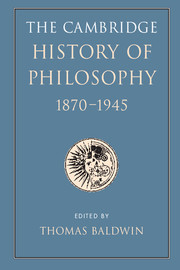Book contents
- Frontmatter
- Contents
- List of contributors
- Introduction
- I 1870–1914
- 1 Positivism, Idealism, and Pragmatism
- 2 Psychology and Philosophy
- 3 Logic, mathematics, and judgement
- 4 Philosophy and the new physics
- 5 The idea of social science
- 6 Ethics, politics, and legal theory
- 7 Philosophy of religion and art
- Interlude
- Philosophy and the first world war
- II 1914–1945
- Biobibliographical appendix
- Bibliography
- INDEX
- References
Philosophy and the first world war
from Interlude
Published online by Cambridge University Press: 28 March 2008
- Frontmatter
- Contents
- List of contributors
- Introduction
- I 1870–1914
- 1 Positivism, Idealism, and Pragmatism
- 2 Psychology and Philosophy
- 3 Logic, mathematics, and judgement
- 4 Philosophy and the new physics
- 5 The idea of social science
- 6 Ethics, politics, and legal theory
- 7 Philosophy of religion and art
- Interlude
- Philosophy and the first world war
- II 1914–1945
- Biobibliographical appendix
- Bibliography
- INDEX
- References
Summary
The division of this volume at the 1914–18 war raises the question of whether the war induced a significant shift in philosophical thought and writing. This is a question which is addressed in English surprisingly rarely (the only extended discussion occurs in Wallace 1988, and this deals only with British philosophers). We are familiar with the thought that the First World War gave rise to a distinctive literature, poetry, art, and so on, and that it at least accentuated subsequent changes in these cultural forms. But the question of whether philosophy was similarly changed is not much discussed, as if philosophy’s status as an abstract, a priori, discipline sets it apart from the messy world of war and politics. But this presumption has only to be stated to be seen to be questionable, since the concepts with which philosophers operate, especially in the areas of ethics and political philosophy, are necessarily grounded in that ordinary social and political world which, at least in Europe, was shaken to its foundations by the First World War.
Yet it is equally important to oppose the view that philosophy is just a cultural superstructure whose development can be explained by changes in underlying social and political conditions – as if one were to propose that the loss of interest in idealism outside Germany after 1918 is to be explained by reference to the First World War. In truth, of course, several chapters in the first part of this book have already demonstrated that challenges to idealism were well under way before the war; similarly in the second part of the book the continuing idealist tradition, outside as well as inside Germany, will be discussed.
- Type
- Chapter
- Information
- The Cambridge History of Philosophy 1870–1945 , pp. 363 - 378Publisher: Cambridge University PressPrint publication year: 2003
References
- 1
- Cited by



